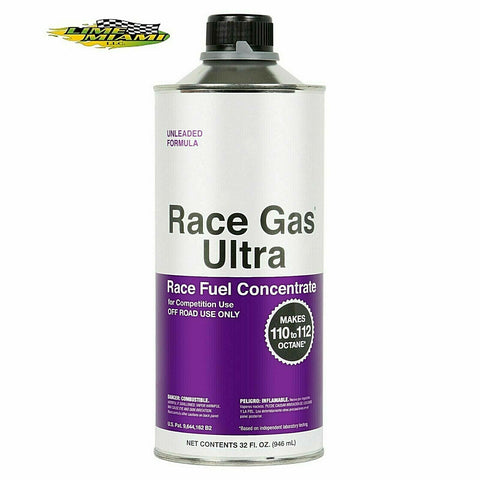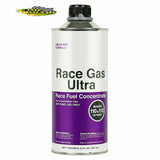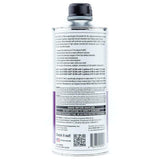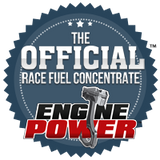
Fuel Additive Model or Series: Race Gas Ultra
Additive Type: Octane Booster
Volume: 32 oz
Maximum Octane: 112 Octane
Volume of Fuel Treated: Up to 4 Gallons (depending on desired octane)
Quantity: Sold Case of 20
TESTED PERFORMANCE:
Unlike some other additives, RACE GAS has been rigorously tested by independent laboratories, prominent engine builders, and performance tuners.
REAL RACING FUEL:
When blended to the proper ratio, RACE GAS can take your ordinary pump gasoline and transform it into high octane, high energy, track grade racing fuel. RACE GAS will keep you from ever running out of racing fuel.
RACE-GAS ULTRA is specifically designed for the requirements of very high compression, boosted or nitrous engines. ULTRA, when mixed with pump gasoline, will create racing fuel with octane between 108 and 112 r+m/2. Like our original product, ULTRA increases the octane, chemical oxygen and chemical energy of the fuel to equal commercially distilled racing fuel.
RACE-GAS ULTRA is a much different formula than original RACE-GAS. “In testing we found the requirements of very high compression engines were different than engines with lower compression or lower boost. We needed to create a formula that could achieve the high octane while still meeting our requirements of high chemical energy and high chemical oxygen in a consistent and predictable way. We chose to use the highest quality pharmaceutical grade chemicals and to avoid using alcohols or naphthalene which don’t meet our design standards” said Dan Muldowney.
“Further, when we did our engine dyno testing we did “like for like” testing against commercial racing fuel. We first did a series of “pulls” with commercial racing fuel. We then drained the fuel and fuel rail and added RACE-GAS ULTRA blended with pump gas. We then repeated the test. We did not change the engine set up or tune during testing”
“We found that we were able to create the same horse power and torque as commercial racing fuel and that the fuel performed consistently under different conditions.”
1 Can RACE-GAS ULTRA + 4 gallons of 89 = 4 gallons of 108 Octane R+M/2
1 Can RACE-GAS ULTRA + 4 gallons of 91 = 4 gallons of 110 Octane R+M/2
1 Can RACE-GAS ULTRA + 4 gallons of 93 = 4 gallons of 112 Octane R+M/2
RACE GAS RACE FUEL CONCENTRATE FAQS
WHAT DOES A FUEL'S OCTANE RATING MEAN?
Octane rating is the standard of measure of the performance fuel in an engine. The octane number is an indicator of the fuel's tendency to burn in a controlled manner versus exploding in an uncontrolled manner. Fuels with a high octane rating and withstand higher compression before detonating or "knocking". Higher compression could be from high compression ratio of the piston / cylinder combination, the use of a super charger or turbo charger, or Nitrous oxide injection.
WHAT IS “DETONATION / KNOCKING / PINGING”?
Detonation, (also called knocking or pinging), is when the fuel in the cylinder fires before the completion of the compression stroke. When detonation occurs the flame front of the combustion is uneven across the piston. The net result is the piston will “rattle” from side to side in the cylinder creating the knocking or pinging sound.
THERE ARE SEVERAL OCTANE NUMBERS FOR GASOLINE. WHAT DO THEY MEAN AND WHICH ONE SHOULD I CARE ABOUT?
There are 3 octane ratings commonly used in the US. Research Octane Number (RON), Motor Octane Number (MON) and Anti-Knock Index (AKI or (M+R)/2). Let's look at each of these individually.
Research Octane Number (RON): RON is the "laboratory" measurement of octane. The octane number is determined by running the fuel in a CRF Test Engine and varying the compression of the engine until the fuel "detonates" or Knocks. The engine is not under "load" and as a result RON numbers generally run higher than the other octane numbers.
Motor Octane Number (MON) is measured using the same CRF engine test however the engine is placed under a "Load" of 900 RPM. This test is a better indication of octane because it better simulates the octane in a real world setting, i.e. under load. MON numbers run lower than RON numbers.
AKI or (R+M)/2 is the Anti-Knock Index. This number is the average of the MON and RON numbers. This number is the most important because it averages the octane under load and at idle. This is the number that you should care most about. When a car company or an engine builder specifies a fuel's octane number for an engine, AKI is the number they are referring to.
WHEN SOMEONE REFERS TO A "POINT OF OCTANE" WHAT SPECIFICALLY DO THEY MEAN?
The scale of octane is a point of confusion for even seasoned motor sports enthusiasts and is a very important issue when evaluating octane enhancement products. A point of octane is 1/10 of an octane number. For example if you increase the octane of 87 pump gas by 8 "points" you are increasing the octane to 87.8. Many consumers see products on the shelf that promise to raise the octane by "10 points" and think that it will raise the octane by 10 octane numbers. That is not the case. Other suppliers rely on this confusion to sell their products. Don't be fooled!
HOW IS RACE GAS DIFFERENT THAN OCTANE BOOST PRODUCTS?
First, octane boosters only add a few points of octane and cannot raise the octane of pump gas to that of racing fuel. What many people don't know is that a point of octane is 1/10 of an octane number. For example, if an octane booster says it raises octane by 9 points and it is blended with 87 octane fuel the final octane number will be 87.9 not 96.
Second, octane boosters will raise the octane they don't increase the chemical energy of pump gas. This is because they are not adding the high quality fuel aromatics that are used in RACE GAS. As a result your engine will not "ping" but it will not generate as much power as it would using RACE GAS.
I CAN'T GET HIGH OCTANE GAS FOR MY BOAT AT THE MARINA. CAN I USE RACE GAS IN MY BOAT?
Yes! RACE GAS will work in any engine that requires high quality, high octane fuel. RACE GAS can be used in:
- Cars
- Snowmobiles
- Motorcycles
- Boats
- Personal Water Craft
- Go Karts
WILL RACE GAS HARM MY O2 SENSORS OR CATALYTIC CONVERTER?
No. RACE GAS does not contain lead or other additives that can harm O2 sensors or catalytic converters.
I NOTICED THAT MY SPARK PLUGS HAVE AN ORANGE DUST ON THEM AFTER RUNNING RACE-GAS IN MY TANK. ARE MY PLUGS FOULED OR SCORCHED?
No! The dust you are seeing is the bi-product of burning fuel with manganese. This dust does not affect plug or exhaust components in any way.
If you are old enough to remember burning leaded fuel, or look at the plugs from someone burning leaded racing fuel, you will see a greyish white dust on the plugs and exhaust pipes. This is the bi-product burning leaded fuels. This dust has no effect on plug performance and will not damage the engine either.
To insure that this dust doesn’t affect engine performance we have been burning fuel blended with RACE-GAS in many cars for the last 3 years. We have added RACE-GAS to every fill up in a Toyota, BMW, VW, Porsche and a Ford for 3 years with no negative effect on the plugs, catalytic converter or O2 sensors. In addition we have 3 race cars with an average of 140 race hours on them using RACE-GAS and have seen no issues. Lastly Tesar Engineering ran 3 Mustangs in the 2,000 Carrera Pan Americano using Mexican pump gas blended with RACE-GAS with no problems and great performance, (See the Testimonials page to read the full story).
IF A LITTLE RACE GAS IS GOOD, WOULDN'T A LOT BE EVEN BETTER?
No! It is possible to "over octane" an engine. While the effects on the engine are less than "under octane", the engine will not perform as well as it would with the right octane fuel. We encourage our customers to talk with their engine builder or people with similar engine configuration to determine the "right octane" for your car.
The chart below represents a good estimate of octane requirements by compression ratio. It is not specific to your engine so you may want to blend your fuel to an octane number or two higher than what is listed below.
| Compression Ratio | Octane Number Requirement |
| 5:1 | 72 |
| 6:1 | 81 |
| 7:1 | 87 |
| 8:1 | 92 |
| 9:1 | 96 |
| 10:1 | 100 |
| 11:1 | 104 |
| 12:1 | 108 |
It is important to note that the octane numbers above are the "Anti Knock Index" number or (R+M)/2.
WILL RACE GAS BENEFIT A STOCK / STREET CAR?
It depends on the car. High performance cars like a Corvette, Viper, Porsche or BMW and turbo charged cars like a WRX will see improved throttle response and power. Cars with carburetors can be tuned to run RACE GAS and will see more power, (changes will need to be made to the carburetor jets and the timing). Regular cars like a Chrysler 200, a Ford Focus or a Toyota 4Runner will not see a great deal of improvement.
It is important to remember not to "over octane" your engine as this will cause a decrease in performance.





